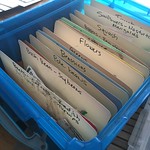
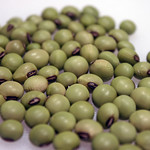
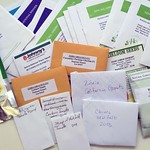
I've been keeping mine in a big plastic box at room temperature, 65-70F (18-21C), and as dry as I can by adding silica gel packets and keeping the top on.
After some reading, I see that the optimum humidity for most vegetable seeds is 20-25%. For legumes it's 44-50%. For temperature, a 10-degree reduction can double the life of my seeds. Optimum storage temperature of most vegetable seeds at home is 41F (5C) or lower, but frozen. It's also important to have a consistent temperature and humidity for storage.
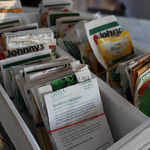
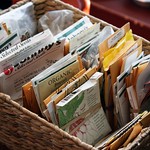
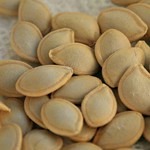
A consistently cooler area I have is the garage. It's 50-60F (10-16C) and 40% humidity. I'll move my storage location out to there, give the beans an open box of their own. I'll keep adding the moisture absorbing packets to the other (closed) box. I'm also curious to check the humidity inside the closed box and see if it's any lower than the surrounding air.
Let me know any thoughts. I never looked into this until a reader commented that she refrigerated her seeds. My seeds last a long time (most about 6 years, some, like tomatoes, 10 years), but I wouldn't mind if they lasted even longer.
Here's an informative site that I found: WFLO Commodity Storage Manual: Vegetable Seeds. (WFLO is the World Food Logistics Org that dedicates itself to the proper handling and storage of perishable products and the development of systems and best practices for the safe, efficient, and reliable movement of food to the people of the world.)
6 comments:
ha. never really thought too much about this. but- so happy to- especially since last year we tripled our garden's size and then spent a lot of money on seeds to go with it! thank you for sharing!
I had read that storing seeds in the refrigerator in a glass jar was the optimum way to store seeds but I, like you, don't have the space for this. I keep my seeds in a couple of old shoe boxes in the basement. My basement is dry and cold. I decided in the shoe boxes because they allow the seeds to breathe, while also keeping light out. I haven't had any problems, thus far, storing seed this way - no mold, no sprouting, and the seeds stay viable for several years (I've managed 4 years for carrot, 2-3 years for onion and 2 years for parsnip seeds). I go by the theory that seed viability has more to do with a consistent cool temperature, low hmidity and darkness. DebS.
I use a "peanut butter jar" method. It's every bit as elegant as the name implies: The seed packets are stuffed in old peanut butter jars (along with desiccant packets) , and the jars are put in a cardboard box in a closet. I like that the jars are airtight, but organization leaves something to be desired. Each "type" of seed gets it's own jar, so for example all the "salad" plants in one jar and all tomatoes in another, but I can usually only find the variety I'm looking for if I pull everything out of the jar and sort through them. If I can find a satisfactory file box, I'm definitely going to upgrade to your method.
I've only saved a few flower seeds (esp. cardinal climber because it's $ to buy plants) and use zip-top baggies. Otherwise, I've only saved excess purchased seed. I used a cardboard box until it fell apart. My plastic bin is roughly sorted veggies with types together on one side, flowers on the other side and is stored in the basement. Wouldn't storing in the refrigerator also take care of any cold-time requirements for seeds if they have them? Or is that taken care of by the producers?
Your storage system is nice, I like the idea of using envelopes to separate types of seed. And I never would have thought to separate by the categories a couple of commenters use. I need to give my system some more thought.
I've noticed that store bought seeds now come in packets with far fewer seeds in them than previously. I guess too many people were saving them for future years.
I must admit that I don't get too crazy with my seed saving. Although after reading the information here I may change that process some. I normally save some tomato, cucumber, pepper and flower seeds for the following year and pass out what I don't use. I ironically did a germination test on some roma, solar flare, green peppers, cayenne peppers and rutger tomatoes with great success, for seeds 3 years old. And they've been sitting in the garage on a shelf, in envelopes, in a basket.
Post a Comment